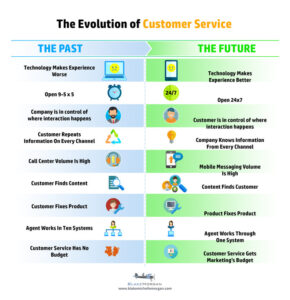Customer service has become a crucial differentiator for e-commerce businesses vying for customer loyalty and retention. Gone are the days of tedious phone calls, lengthy email exchanges, and frustrating wait times. The modern customer expects instant gratification, personalized interactions, and seamless support experiences that rival those of brick-and-mortar stores. To meet these evolving demands, e-commerce businesses are turning to cutting-edge technologies like chatbots, artificial intelligence, and personalization to revolutionize their customer service strategies. Harnessing the power of these innovations, businesses can not only resolve customer queries more efficiently but also create tailored, empathetic, and proactive support experiences that drive long-term loyalty and advocacy. In this post, we’ll delve into the transformative impact of chatbots, AI, and personalization on e-commerce customer service, and explore how forward-thinking businesses are leveraging these technologies to stay ahead of the curve.
The evolution of customer service in e-commerce

The world of e-commerce customer service has undergone a remarkable transformation over the years. From the early days of fragmented, manual support systems to the modern era of AI-powered, omnichannel experiences, the evolution of customer service has been nothing short of remarkable. In the past, customer inquiries were often met with lengthy response times, frustrating phone calls, and generic, impersonal responses. But with the advent of technology, e-commerce businesses have been able to revolutionize their customer service strategies, leveraging innovative tools and platforms to deliver faster, more personalized, and more efficient support experiences. The rise of chatbots, for instance, has enabled businesses to automate routine inquiries, freeing up human agents to focus on more complex, emotionally charged issues. Meanwhile, the integration of artificial intelligence (AI) has enabled businesses to analyze customer data, anticipate needs, and deliver hyper-targeted support experiences that feel tailored to each individual. As a result, customers are no longer just passive recipients of support, but active participants in a dynamic, two-way conversation that is redefining the very fabric of e-commerce customer service.
The rise of chatbots: Automating support for efficient resolution

In the era of instant gratification, customers expect swift and seamless support experiences. The traditional model of customer service, reliant on human representatives and lengthy wait times, is no longer sufficient. Chatbots are revolutionizing the way businesses handle customer inquiries. These virtual assistants can answer frequently asked questions, provide product recommendations, and even troubleshoot basic issues – all without human intervention. Here’s how chatbots are shaping the future of e-commerce customer service:
24/7 availability: Chatbots never sleep! They can answer customer questions and provide basic support 24 hours a day, 7 days a week. This ensures that customers can get the help they need whenever they need it, regardless of time zone or business hours.
Automated tasks: Chatbots can handle routine tasks such as order tracking, product returns, and appointment scheduling. This frees up human customer service representatives for more complex issues that require a personal touch.
Increased efficiency: By automating repetitive tasks, chatbots can significantly improve the efficiency of customer service operations. This allows businesses to handle larger volumes of inquiries while reducing wait times for customers.
As the technology continues to advance, chatbots are becoming increasingly sophisticated, integrating with AI and machine learning algorithms to improve their understanding of customer needs and preferences. The result is a support experience that is not only efficient but also personalized, setting a new standard for e-commerce customer service.
The power of AI: Personalizing customer interactions with emotional intelligence
As e-commerce continues to evolve, the role of artificial intelligence (AI) in customer service is becoming increasingly vital. By infusing emotional intelligence into AI-powered chatbots, businesses can now create personalized customer interactions that are not only efficient but also empathetic. This can take several forms:
Contextual conversations: AI-powered chatbots can analyze past interactions and customer data to provide contextual support. Imagine a chatbot that remembers a customer’s previous purchase and can recommend similar products or answer questions specific to that purchase.
Predictive service: AI can analyze customer behavior and purchase history to predict potential issues and proactively offer assistance. For example, if a customer abandons their cart, an AI-powered chatbot could send a message offering help or reminding them of the abandoned items.
Sentiment analysis: AI can analyze the sentiment of customer interactions to identify frustrated or dissatisfied customers. This allows businesses to intervene quickly and address any issues before they escalate. Imagine a customer service experience where the chatbot not only understands your query but also senses your frustration, apologizes, and offers a solution that’s tailored to your specific needs.
The human touch still matters
While chatbots and AI offer undeniable benefits, it’s important to remember that human interaction still plays a crucial role in e-commerce customer service. AI and chatbots should be seen as complementary tools that can enhance the overall customer experience, not replace human interaction entirely. Here’s how businesses can strike the right balance:
Clearly communicate availability: Be upfront with customers about when they can expect to interact with a chatbot or a human customer service representative.
Offer seamless transition to live chat: When a chatbot reaches its limits, it should seamlessly transfer the customer to a live chat session with a human agent.
Empower human agents with AI insights: Provide human customer service representatives with AI-powered insights to help them personalize interactions and resolve issues more efficiently.
Real-world examples: How e-commerce businesses are revolutionizing customer service
In the world of e-commerce, companies are no longer just competing on product offerings and prices, but on the quality of their customer service. Forward-thinking businesses are leveraging the power of chatbots, AI, and personalization to revolutionize the way they support their customers. Take, for example, the online fashion retailer, ASOS, which has implemented a chatbot that helps customers track their orders and provides personalized styling advice. Or, consider the beauty brand, Sephora, which uses AI-powered chatbots to offer customers personalized product recommendations based on their skin type and preferences. Another example is the online retailer, Zappos, which uses machine learning to analyze customer interactions and provide personalized support through its “Customer Loyalty Team”. These companies are just a few examples of how e-commerce businesses are using innovative technologies to deliver exceptional customer experiences, increase customer loyalty, and drive business growth.
Conclusion
As the e-commerce landscape continues to evolve, it’s clear that customer service is no longer just about resolving issues, but about creating a seamless, personalized, and memorable experience for customers. The integration of chatbots, AI, and personalization is revolutionizing the way businesses support their customers, providing them with instant, intuitive, and tailored solutions. In leveraging these technologies, e-commerce businesses can not only reduce support costs and improve response times but also build brand loyalty, increase customer satisfaction, and drive revenue growth. As we move forward, it’s essential for businesses to stay ahead of the curve and continue to innovate their customer service strategies, ensuring that they provide a truly exceptional experience for their customers.
